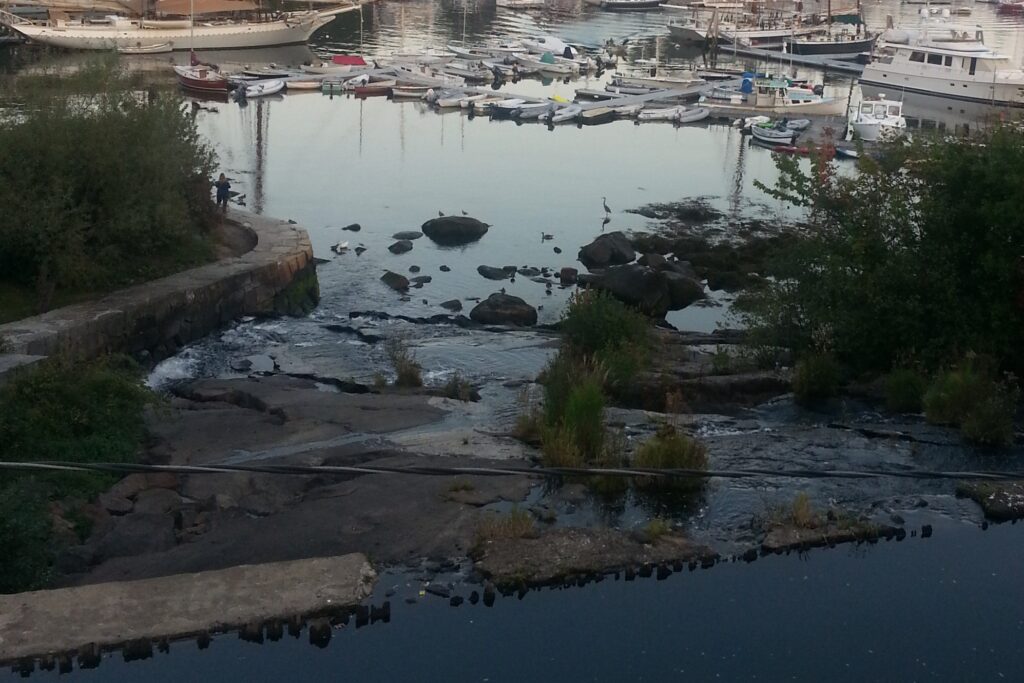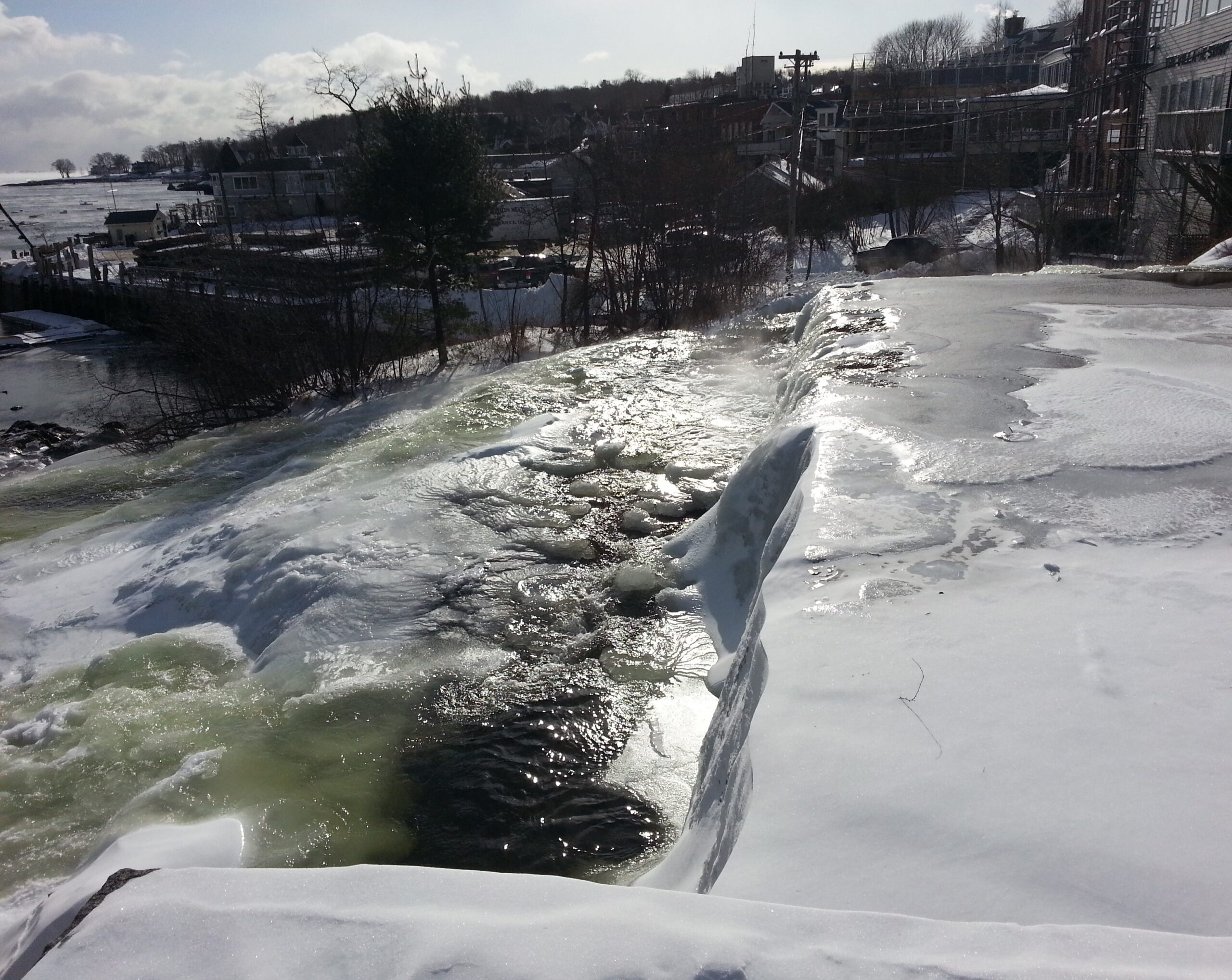Our country is in a hostile mood. Hostile towards outsiders, and hostile towards each other. It’s a mood that has been gaining in intensity for years and is not exclusive to any political party or persuasion. For those of us who care about the climate, the state of the Earth, and the health of our own and other species, it’s long been hard to see a way forward through all that hostility in Washington.
At local level, it’s different, we’re told. There are climate- and Earth-friendly ways forward. But how to widen and lengthen those paths when venom akin to that in national politics threatens to poison our local political life, too? We’re seen this threat at Maine state level recently. Right here in Camden, hostility has bordered on the venomous for years over the Montgomery Dam.
The practicalities and aesthetics of how the mill stream enters our harbor are important, but they aren’t vital to the town’s future. What is vital is that we get beyond the venom and move forward as a community on this and the many other issues the climate and associated crises are posing to our town, region, and world.
How to help people of divergent views work together as a community has been a central question for CamdenCAN since we formed ourselves into a group two springs ago. How do we spread our ideas about the importance of reducing Camden’s greenhouse gas emissions and promoting“environmental and social resilience” across our community? Equally important, how do we give everyone in town a chance to express their views on climate issues – and open our hearts and minds to the ideas and feelings they express?

Montgomery Dam
Is it even sensible to try, as a group advocating for “Climate Action Now,” to work across the partisan and other lines that divide our country and threaten to split our small community?
I think it is, and I think cooperation needn’t equate with accepting “the lowest common denominator.” At its best, community cooperation can allow us to define and resolve issues in ways that are radically innovative, and radically affirmative of who we are now and what we want to become. Approaching issues from a fresh perspective and shedding hostile habits of thought can help avoid having to make painful compromises at the end of a tense process or, worse, becoming paralyzed by mutual hostility.
Camden faces a test case for my hopeful theory around a June 10 vote on the recommendation of the Megunticook River Citizens Advisory Committee (MRCAC) to remove the Montgomery Dam and make the river free-flowing at its entrance to the harbor.
Speaking Personally
I have personal opinions on this. I agree with the majority MRCAC view that we should take out Montgomery Dam. I favor removal of the Knox Mill anx Knowlton Street dams, too, so that the stream is free-flowing up to Seabright Dam. With the help of fish ladders at Seabright and the East and West dams that form the big lake, I’d like to see us bring all the fish we can into Lake Megunticook. Whether alewives were there centuries ago or not, helping them get to the lake now will replenish massively diminished flora and fauna and hopefully preempt even more species loss as the climate warms.
But I also agree with MRCAC member Tyler Smith that “the aesthetic value of the MegunticookRiver as it flows into Camden Harbor is vital to the town’s appeal and economic health,” and that MRCAC – I would say all town residents – “still have much to understand and address regarding the aesthetic challenges associated with dam removal.” In my view, the town should consider financially and/or with design options helping merchants around the stream entrance to the harbor adapt their properties to optimize both their business prospects and also the town’s appeal to tourists and residents alike.
Procedural mistakes contributed to hardening of opinions. People felt they weren’t being listened to, with some cause, as I wrote nearly four years ago. But by now, it’s all water over the dam, so to speak. This isn’t a partisan issue between Democrats and Republicans. Nor a debate about whether we value the history of this piece of land we call Camden. Valuing Camden’s industrial history doesn’t require putting a factory back on the town landing. Respecting the Olmstead design of Harbor Park and Mary Louise Bok’s many gifts of property to the town shouldn’t preclude change. As a town, we need to move on.
However, that’s just my personal opinion, for which CamdenCAN bears no responsibility.
CamdenCAN
For CamdenCAN, the important thing is holding personal feelings aside and working with others to develop a “consensus” — something we’ll all accept, even if some of us like it more than others.
The fight over Montgomery Dam was already in high gear long before CamdenCAN came on the scene. As a group, we have not taken a position on Montgomery Dam in the nearly two yearssince. We’ve been asked why not. As with everything to do with the Megunticook River, the answer is complex. But at core, it’s because rather than diving into matters on which hard battlelines have already been drawn, CamdenCAN is focused on creating a climate of community around less ossified issues.
We want to help the people of Camden work positively and productively to make our community less of a contributor to climate and other ecological crises afflicting the world, and better equipped to deal with the havoc those crises are inevitably bringing.
That goes for supporting town efforts to make our harbor-front more resistant to storms even more intense than those we saw in early 2024. It goes for encouraging the town to buy the solar array Camden built and still leases on Sagamore Farm. It goes for working with Rockport on developing free “home energy coaching” and helping our communities better understand the emergency procedures developed by town officials in case of inland flooding and potential wildfires. And for organizing talks by knowledgeable speakers on climate and related issues, as well as climate discussions and potlucks among ourselves.
That’s a lot for one small, young group to take on. Maybe CamdenCAN will be willing and able to participate in future stages of debate on the Megunticook River, on our own or in collaboration with others. But as we see it, the important thing now is to work together as a town.We’re hoping the June vote on MRCAC’s proposal will make that easier. Please do your part: Study up and VOTE on June 10.
Sarah Miller is a Camden resident, CamdenCAN steering committee member, semi-retired journalist and blogger.


